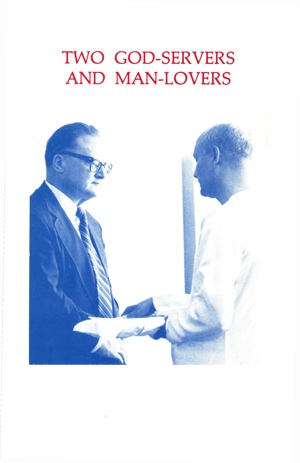Table of Contents
Part I — Questions by Mr Robert Muller
- Mr Robert Muller: The first three of U Thant's four categories of needs, namely physical, intellectual and moral needs, do not create any insuperable problems, but the last and most important one in his view, spirituality, gives me considerable difficulties. There are indeed so many definitions of that term. U Thant described it as "Faith in oneself, the purity of one's inner self." Suppose — as I would ardently wish — that humanity would adopt some day his four broad categories of goals. How would you define the spiritual goals?
- Mr Robert Muller: I often think that U Thant's four categories of human qualities or needs — physical, intellectual, moral and spiritual — could well form the basis for a world agenda of human goals. From your writings, I notice that these categories are also quite fundamental to you, but you add to it a fifth which you call the "vital." Could you elaborate on it?
- Mr Robert Muller: When I speak to audiences about U Thant's four ways to happiness, I sometimes hear the following criticism: "Life is one and cannot be artificially cut into four. Everything is interdependent and linked. We must concentrate on life as an entity and not on components which are the product of the intellect." I am not over-impressed with this argument, for I have indeed observed that life is richest when I cultivate simultaneously all four categories of needs, namely physical, mental, moral and spiritual. Nevertheless, there is some truth in that criticism and I would be grateful to learn how you would respond to it.
- Mr Robert Muller: Do you think the UN exercises a real influence in the world? What is, in your view, its principal contribution? How does it appear to you in the great stream of history and human evolution?
- Mr Robert Muller: If you were given the task of laying down the basic principles for the education of all the children of this world, what would be your recommendations?
- Mr Robert Muller: Anthropologists have found a gradation of religious beliefs over the history of mankind: ritualism, animism, ancestor worship, polytheism, monotheism. All these forms were associated with changes in the social structure. Recently, the "age of reason" and the scientific and industrial revolution have rendered religion and spirituality obsolete — even harmful — in the eyes of many. What, in your view, is likely to be the "religion" or "spirituality" of humanity tomorrow as a satisfactory answer to man's queries about his relationships with the universe, his fellow men and the mysteries of life? Is this likely to be reflected in the United Nations as a forum where humanity is seeking new ways for its destiny and fulfilment?
- Mr Robert Muller: U Thant often said that in his view the West was too materialistic and intellectual, and not spiritual enough, whereas the East was too spiritual and fatalistic, and not caring enough for the material and intellectual welfare of the people. Do you see a synthesis developing between the two and how would you envisage a harmonious, happy world society?

